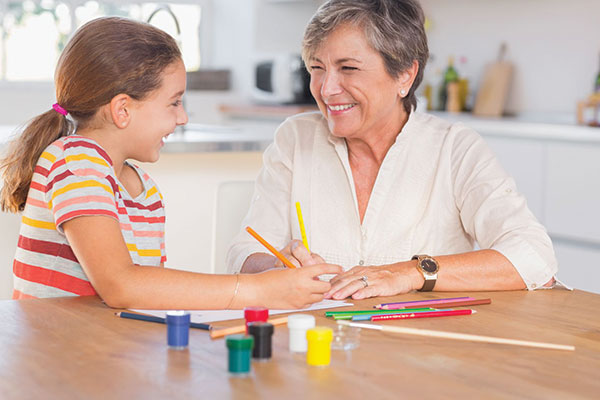When a Grandparent Has Cancer
by Kathleen McCue, MA, LSW, CCLS
There are many excellent resources for talking to children when a mom or dad is facing cancer. Countless websites, books, and magazine articles have addressed these issues, and the same points are identified and emphasized time and again:
- Be honest with children.
- Offer information at the child’s developmental level.
- Use the word cancer, instead of just saying that the person with cancer is sick, to help children distinguish between this illness and others he or she may encounter.
- Discuss feelings and emotions as much as you discuss the facts about cancer.
- Emphasize ways for children to manage their reactions to the cancer.
- Prepare children for what they will see, hear, and experience.
- Assure children that they didn’t cause the cancer and they can’t catch it.
- Help children understand how their own lives will be affected by a parent’s cancer.
- Maintain as much of a normal routine as possible.
But what if the person with cancer is a grandparent, instead of a parent? Do the same strategies apply? The short answer is yes. However, there are some special considerations when helping a child cope with a grandparent’s cancer.
It is critical that parents and grandparents work together to decide what, when, and how to tell children about a grandparent’s cancer.
First, it’s important to remember that the most significant relationships in a child’s life are usually with his or her parents. The reason so much focus is put on helping children when a parent has cancer is we know that any challenge affecting a parent will also affect the child.
But a child’s relationship with his or her grandparents is important too. It can be very confusing and disturbing for a child to hear one thing from a parent and then something conflicting from a grandparent. Therefore, it is critical that parents and grandparents work together to decide what, when, and how to tell children about a grandparent’s cancer. You don’t want children to be caught in the middle of a conflict or disagreement between two very important people in their lives.
Parents generally have the ultimate responsibility for and authority over their children. So, even though it may be difficult, grandparents must respect the final decisions made by the parents regarding information provided to their children.
There are many types of relationships between children and grandparents. Some children are incredibly close to their grandmothers and grandfathers. Perhaps the grandparents care for the children while their parents are at work. Or they live nearby and see their grandchildren frequently. Perhaps the grandparents are actually legal guardians for their grandchildren. For children in these types of situations, their responses will be very similar to those of a child whose parent has cancer. The stronger the relationship between grandparent and grandchild, the stronger the reactions the child will probably have, and the more support that child will need.
Sometimes the relationship between grandparents and grandchildren is not that close. Such might be the case when the grandparents live in another city or state and only see their grandchildren occasionally. However, it can be shocking to see a changed or ill grandparent, so children need to be prepared for what they will see before going for a visit.
If a parent is spending a lot of extra time caring for the grandparent with cancer, children may react negatively to the parent’s absence. Children may also react to the worry and stress they perceive in their parents. Therefore, sometimes parents may need to provide a child with extra information about the situation and make sure that the child has additional support.
Even though grandparents are encouraged to follow the wishes and guidance of the parents in talking to their grandchildren about cancer, grandparents should not be put in the position of having to be dishonest with their grandchildren. What if a child asks a grandparent “Do you have cancer?” or “What’s the matter with you?” and his or her parents haven’t given the grandparent consent to discuss the topic with that child? The grandparent can affirm that the child has asked a very good question, and suggest that they talk to his or her parents together about it. Then, the grandparent should let the child’s parents know what’s coming and encourage an honest but hopeful response.
By working together, parents and grandparents can help children understand and cope well with cancer in the family while also teaching them skills for managing any challenges they may face.

Kathleen McCue is the children’s program director at The Gathering Place (TouchedByCancer.org), a cancer support center in Northeast Ohio. Kathleen is the author of several books, including Someone I Love is Sick, a resource for helping very young children cope with a parent or grandparent’s cancer.
This article was published in Coping® with Cancer magazine, July/August 2014.


